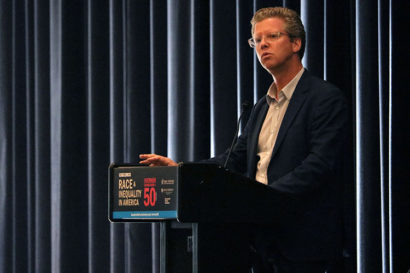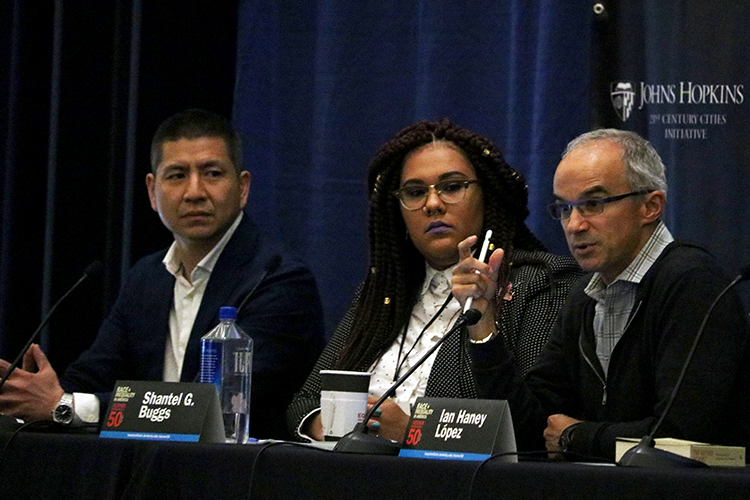Kerner@50 speakers find progress scant – and the fight against racism in peril
Experts set out to understand how to dismantle structural racism in Trump's America
February 28, 2018

UC Berkeley Professor john powell gave opening remarks at the “Race & Inequality in America: The Kerner Commission at 50” conference. (UC Berkeley photos by Kirpa Singh)
What does it mean to fight long-term, structural racism in the time of President Donald Trump?
That’s the topic that consumed the opening evening of UC Berkeley’s three-day conference marking the 50th anniversary of the Kerner Commission Report, the government study published in 1968 examining the causes of widespread racial animosity and unrest and recommending solutions.
The nonpartisan commission was created by President Lyndon Johnson and given wide latitude to examine inequality and racism in America. The final report concluded that white society had denied opportunity to black Americans living in poor urban neighborhoods and called on political leaders to make significant investments in housing, criminal justice reform, education and public health.
But few of those ideas have become real, and what little progress there has been is being undone by the Trump administration, speakers said during opening remarks and a panel examining 50 years of racism in America.

Shaun Donovan, secretary of Housing and Urban Development in the Obama administration, called on listeners to “come together” to fight patterns of structural racism.
“We come together today at a moment of great peril for the national project that the Kerner Commission called us to embark on 50 years ago,” said Shaun Donovan, President Barack Obama’s first secretary of Housing and Urban Development and a keynote speaker at the conference. “That threat is real in all the policies the Trump administration is trying to roll back.”
A study released this week by the nonpartisan Economic Policy Institute in Washington, D.C. found that since the Kerner Commission report was released, the unemployment rate for black Americans has increased, the share of incarcerated blacks has almost tripled and the wealth gap between blacks and whites has nearly tripled.
But despair is the easy answer, argued john powell, the director of the Haas Institute for a Fair and Inclusive Society and a professor of law, ethnic studies and African American studies at UC Berkeley. powell spells his name in lowercase in the belief, he has said, that we should be “part of the universe, not over it, as capitals signify.”
“It is easy to be cynical, it is easy to be depressed, it is easy to think that we should all move to Canada – but we need to do our work right here,” powell said at the conference. “In some ways you could say the recommendations of the Kerner Commission are the road not taken, but the road is still there.”

A panel featuring UC Berkeley Law Professor Ian Haney López examined racial justice and the politics of resentment.
Oscar Dubón Jr., the vice chancellor of equity and inclusion, called on the 150 students, faculty and community members in attendance to do the work to push the country to follow the recommendations of the Kerner Commission.
“We can’t wait another 50 years for progress to happen,” he said, during opening remarks. “We really need to have progress now, and find ways to mobilize for that progress to have impact.”
Conference participants also spoke Tuesday on KQED’s Forum program about the legacy and impact of the Kerner report. The guests included powell, Donovan, former U.S. Senator Fred Harris, the only surviving commission member, and Sandra Susan Smith, a UC Berkeley sociology professor. (Listen to the hour-long program.)
The Race & Inequality in America: The Kerner Commission at 50 conference continues on Wednesday and Thursday.
Contact Will Kane at [email protected].